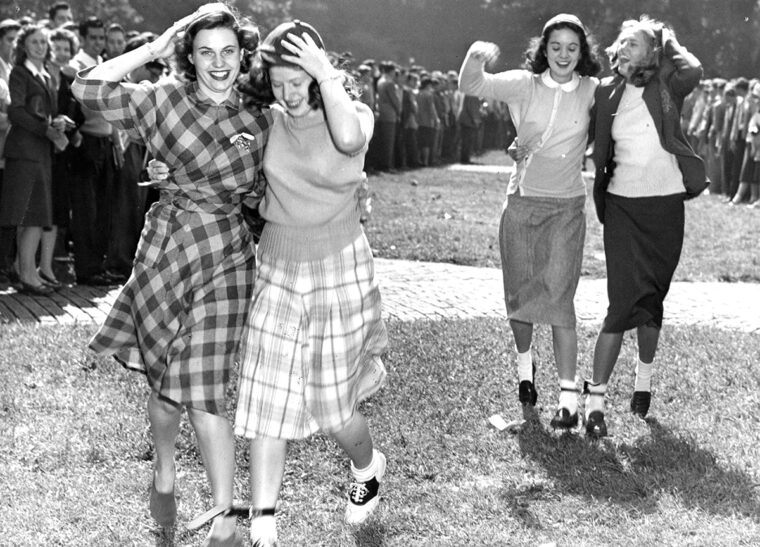Having a ball during Senior Week
“The senior week Cards game! It was a beautiful day, and I think only the second pro baseball game I’d ever attended in my life. I don’t remember the team we played or who won, but I remember sitting with my friends and eating stadium food.”
— Amy Wen, AB ’15 (biology)
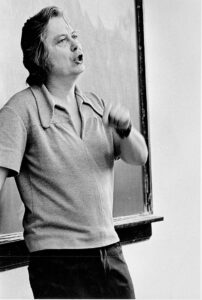
Gass on ‘fashionable taste’
“In the spring semester of 1975, Professor William Gass opened a course on “Modern Aesthetics” (Phil 438) by stating “Fashionable taste is always wrong,” and [he] clarified that he was including “intellectually fashionable taste” in the indictment. Then he paused to give the class an opportunity to refute it. Silence ensued; there weren’t any takers.”
— Robert G. Simon, BA ’76 (history)
Courtships in college:
“I will always remember strolling and holding hands with my girlfriend in Brookings Quadrangle. Courtships in college were very special and honest because students focused on character and were not influenced by wealth and job status.”
— Jim Arger, BA ’69
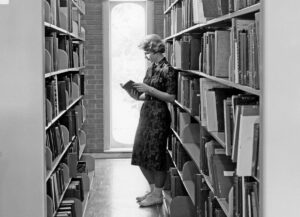
Locked in the library:
“I got locked in the library while I was studying — nothing resulted, except I thought I had died and gone to heaven. I loved the library!”
— Theresa Riley Shaw, MAEd ’90
Proud to be a member of WashU community:
“My memories are simple, but they make me so happy. I recall strolling around the campus and feeling very proud to be there. WashU has been a great place in St. Louis history, and as I was growing up, I included the campuses in my tours of the city, which confused [at first] friends and family. But they were always impressed with the magnificent old campus. And then they were also gobsmacked when I took them downtown to the med school. Thank you for being there and keeping it great!”
— Ted Washburne, BSPT ’85
“I started in chemical engineering and ROTC in 1959. Then I had to leave due to the Vietnam War. I returned to University College in 1966 and finished in the business school. I went on to study at other universities and received graduate degrees. I taught business courses at colleges and universities all over the United States. As a guest, I have attended Washington University Century Club seminars. And I believe Washington University is the best university in the country.”
— Donald Loeffler, BS ’72
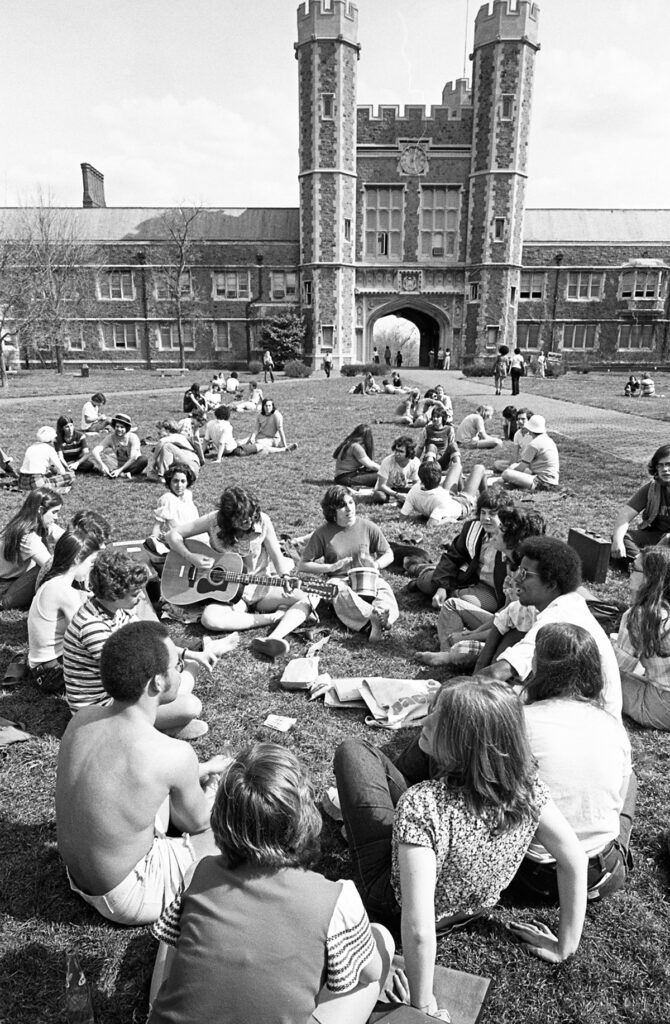
Finding connection:
“During the spring of 1977, I watched, along with my black friends, the mini-series Roots. It was an emotional, yet inspiring experience. During the mini-series, I felt as if some people wanted to tip-toe around us because they feared that we were angry. We were, but we were also handling our emotions in productive ways.
The following year, the Holocaust mini-series aired during the spring of 1978. Again, it was an emotional, yet inspiring experience for me. I was able to find connection with my Jewish classmates, and we realized that both groups have similar historical experiences that have shaped our past, present and future.
I am glad that I experienced both of these mini-series while I was a student at WashU. In light of recent events in our country, I wonder how much we need to continue to educate each other about negative experiences that impact the past, present and future of individuals, groups and our nation.”
— Claretta McDaniel, AB ’77, AB ’78
Making friends:
“There is never another time in our lives when we make friendships and have camaraderie with other classmates and have courtships that are honest and sincere as those we had at WashU.”
— Jim Arger, AB ’69
Favorite concerts and speaking engagements:
“The Grateful Dead in the Quadrangle, Bonnie Raitt at Graham Chapel, Dick Gregory at the Field House, Ramsey Clark and former Black Panthers speaking at Graham (not together).”
— Susan Keller, AB ’72, MSW ’73
World War II vets:
“1946 … at 16, sitting in class with veterans of WWII, so overflowing we had to sit in the aisles and on radiators in Brown Hall.”
— Patricia Seyfried, BFA ’50
Held up:
“I remember Bryant Foster rushing into my office yelling, ‘We have been robbed.’ In the 1950s and ’60s, the university had a cashier’s office in Brookings Hall. Some employees were paid twice a month, and many cashed their checks at the cashier’s office, so there was lots of cash in the office on those days: $50,000 to $60,000.
“Early that morning several men entered the office and locked the doors behind them. They gathered all the employees on that side of Brookings and put them in the university vault. Then they took about $42,000 and fled. They were never heard from after that.
“We had a hard time getting police to come to the scene. We called the police in St Louis, Clayton and University City, and they all said it was not in their jurisdiction so they couldn’t come. Finally, we called St Louis County. Since there were no county police in the university area, it took them about 45 minutes to show up. The thieves were long gone.
Shortly thereafter, we closed the cashier’s office.”
— Joe Evans, AB ’52
Outside diversions:
“Those football games with Professor Irving Horowitz in the McMillan Courtyard!”
— Alex Blumenstiel, MS ’65, PhD ’68
Speed bump assist:
“When my anticipated birth date, July 4, came and went, my father drove my frustrated mother over the traffic bumps in the driveway from Lindell Blvd. to Brookings Hall repeatedly, and I was born four days late. My two younger sisters and I each earned degrees from WashU, and two of us met our husbands on campus. I have no memory of my first visit, but my mother appreciated the assist.”
— Royanne Chipps Bailey, AB ’61
“I’ll never forget the day the stands collapsed in the middle of a Bears football game at Francis Field.”
— Martha Pike Holland
Football flashback:
“I’ll never forget the day the stands collapsed in the middle of a Bears football game at Francis Field. I think this was my freshman year in 1947, and the highlight of a Saturday in the fall was attending the football game. I remember my surprise when it happened and the relief that no one was hurt, including me.”
— Martha Pike Holland, AB ’51
From Ghana to St. Louis:
“I walked into the Admissions Office of the Brown School one beautiful morning in late August of 2007 as a new arrival in the United States of America [from Ghana], and a brand new student of Washington University in St. Louis! But when I was handed a map of the university and showed the way toward the international students’ office to go through the registration processes, I felt like a ‘Johnny-Just-Come’ and wondered if I could handle it all alone by myself for the two years ahead of me. I walked on, and the map guided me through to the Women’s Building, and by the time I returned to my starting point an hour later, I had an ID, had opened a bank account and had been fully registered as a student of the Brown School! Quietly I sailed through with a scholarship from the American Association of University Women (AAUW), and the Brown School also provided a Dorice Pirtle Scholarship and topped it off with a Shanti Khinduka Scholarship. The beautiful Olin Library was where I passed most of my time, and in two years, I sat with pride in the Quadrangle among the other students listening to word of wisdom. Then I walked away with nostalgic tears in my eyes. I cannot forget these special events in my life.”
— Rebecca Kitcher, MSW ’09
Beaux Arts ball:
“I have so many wonderful memories as an undergraduate art student at WashU that it is very difficult to select one. A particular one that stands out is the Beaux Arts costume ball sponsored by the School of Art and the School of Architecture once a year. Each year a costume theme was selected for the students and faculty. Everyone was bused to a location off campus, and in my second year the location for the ball was Meramec Caverns. The costume theme was a well-known painting or sculpture or a period in the history of art. Once we arrived at the caverns, the food and drinks began with live music for dancing. Later, the parade of costumes began with a judging for the best costume. The winner was a couple dressed as Van Gogh’s Sunflowers. After everyone was bused back to the WashU campus, many of the students and faculty went to private parties to continue the celebration. The schools of art and architecture picked up the costs for the costume ball, which allowed everyone to attend. In reflection, such generosity by Washington University made the university experience a memorable one.”
— Eugene Markowski, BFA ’60
Project Mercury and a parking lot:
“I worked the graveyard shift at McDonnell Aircraft Co. and attended WashU day classes, studying engineering courses. I was working on the space program on Project Mercury. After getting off work at 7:30 a.m., I would drive to WashU and go to class.
“The morning that Alan Shepard was rocketed into space for the first U.S. manned suborbital flight, I was looking for someplace that was open that had a television, so I could see the flight. I didn’t see any place of business open along the drive from McDonnell to WashU. When I finally arrived at school and found a parking space, I was listening to the flight on the radio. Just as the blackout of communications occurred on re-entry, the radio quit working in my car. I then ran up and down the parking lot until I found another person listening on his radio. So I knocked on the window and asked if I could join him. Holding our breaths, and seemingly forever, the communication was re-established with the Mercury Capsule and Shepard landed safely.
“I continued to work on the space program for several years on Mercury and Gemini. Thanks to Washington University, I earned my degree and eventually retired as chief engineer of the McDonnell Aircraft Instrumentation and Automated Systems Branch.”
— Paul Fleetwood, BS ’65
Working at Fat Albert’s:
“As manager of Fat Albert’s, there were so many wonderful memories, from having cheese bagels and ice cream sundaes served when people needed it most to having future coffee house singers appear free of charge hoping to impress someone in the audience or just get them to listen. We had a great crew who learned how to manage a business, provide customer service, have fun until midnight, which occasionally ending in a food fight or finding someone streaking through ‘naked as a jay bird.’”
— Dean Shulman, AB ’77
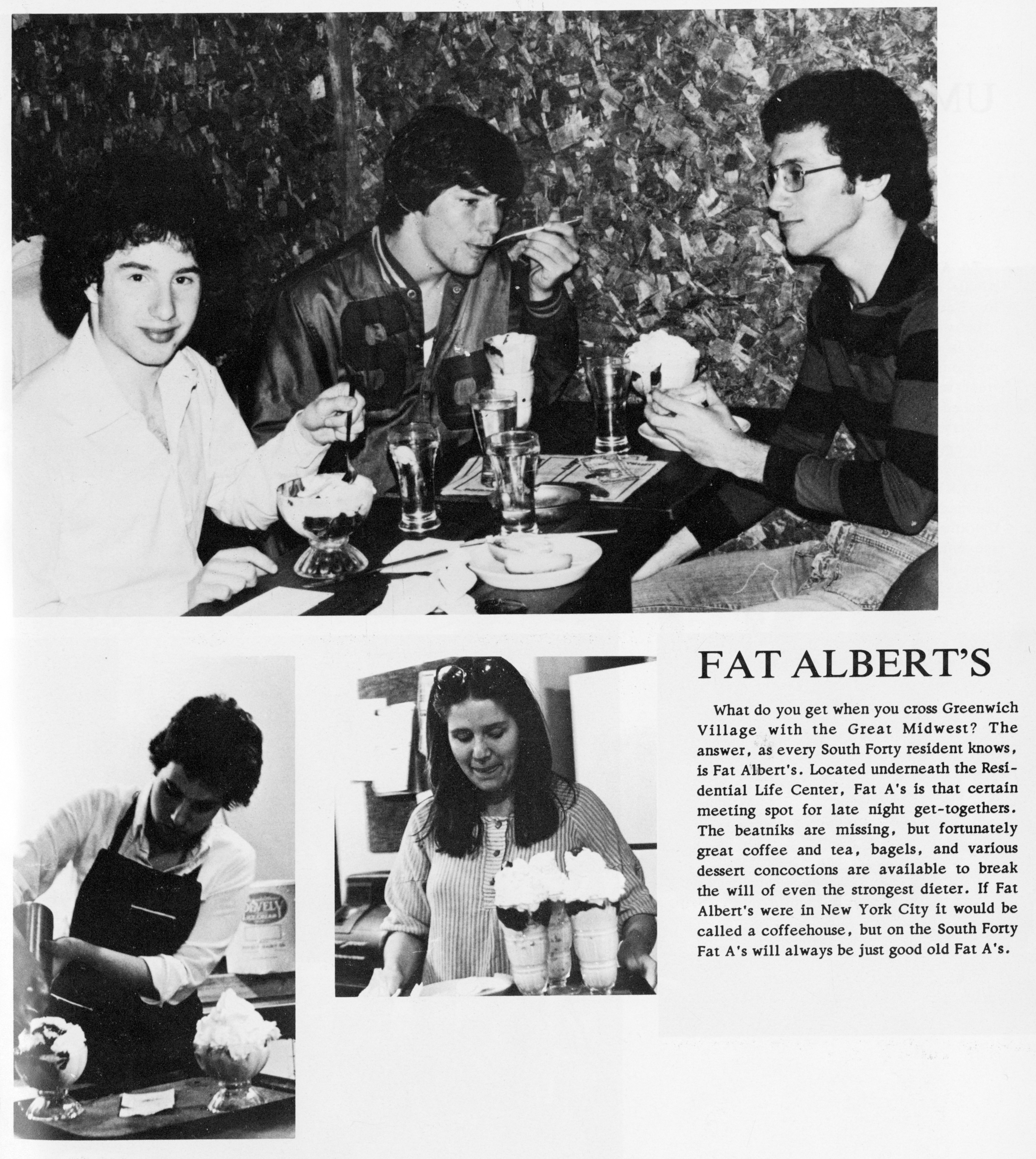
Chan Dan prank in the Quad:
“[I remember] being part of the group who plotted, planned and successfully accomplished the installation of a picture of Chancellor Danforth’s face on the quad clock.”
— Barbara Galler, AB ’75
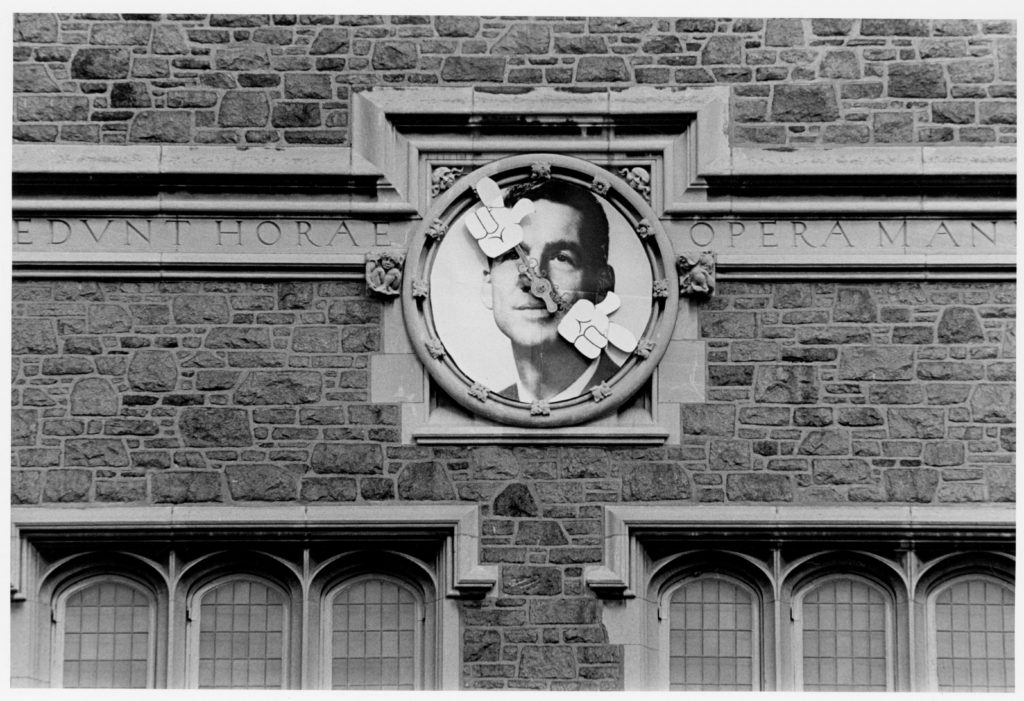
On presidential debates:
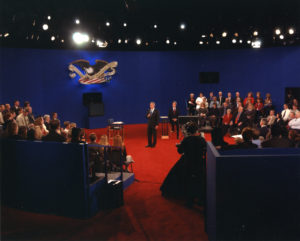
“My wife and I have participated somehow in nearly all of the debates, and I came out here today (Saturday) because I wanted to see what my campus looks like now. Graham Chapel is still there, and Fox News is set up right in front of it, and it just looks amazing. And despite all this daily changing controversy, there’s some stability in this world and that’s what Washington University represents. Both of my parents went to school here; my father graduated from the medical school in 1925 so I’ve been attached to this university for a long, long time. That’s why I want to keep coming back.
“My favorite debate was the one where President Bush was running again (Bush vs. Kerry). I thought that was probably the most substantive.
“There have been so many low blows this time around, but nonetheless, it’s dramatic theater. The Performing Arts Department should be paying close attention to how all of this has played out.
“Overall, I’m very proud that I’m associated with WashU.”
— Robert Westerman, AB ’64, EMBA ’94
Awesome Commencement:
“Graduation was one of the most awesome experiences of my life — walking into the Quad, seeing all the people, all the students and not to mention [hearing] a fantastic speaker. It was totally memorable.”
— Sharon Ellis, MA ’16
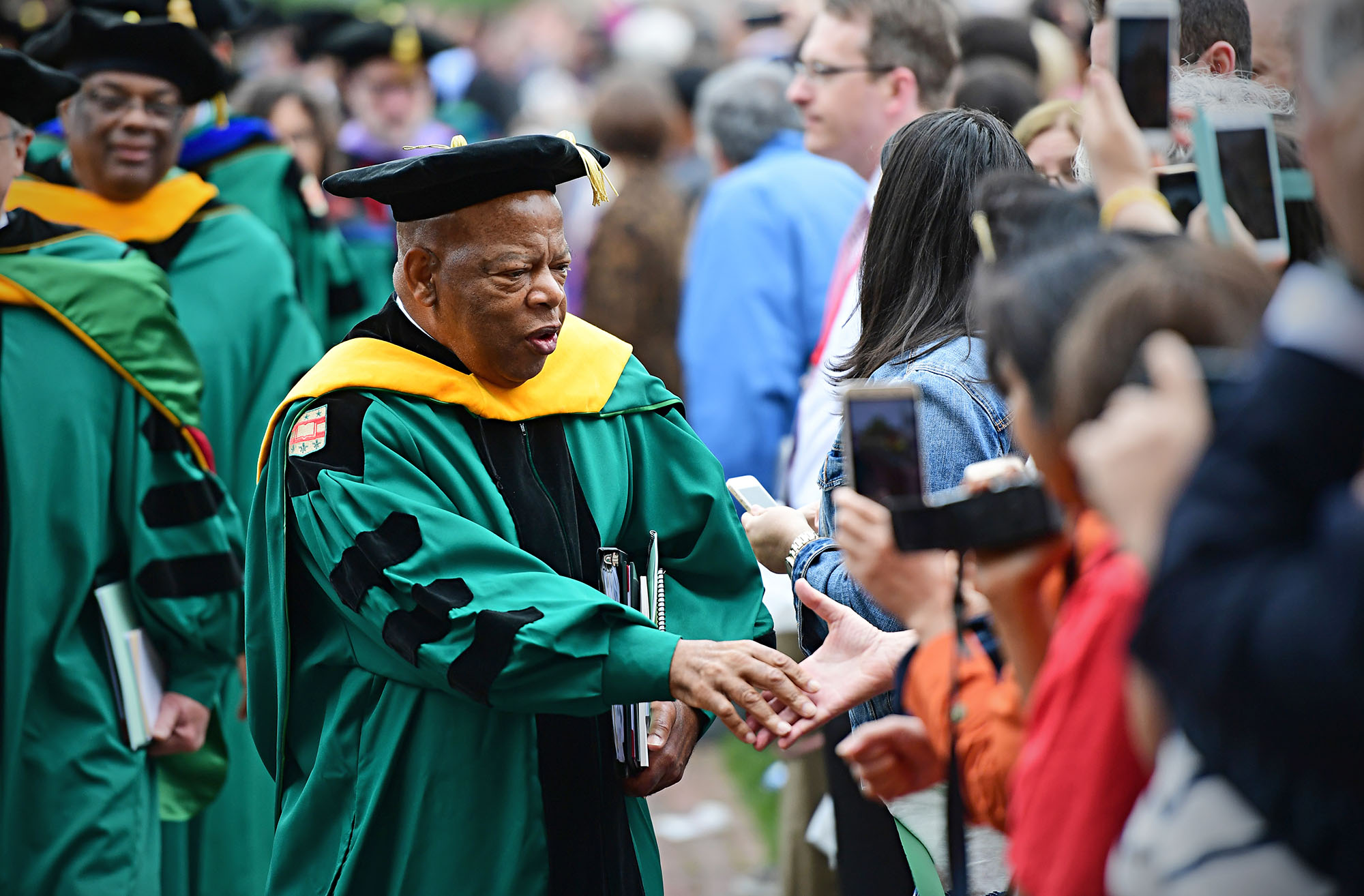
A Jimmy Hoffa visit:
“I was down in the Law Quarterly office in the spring of 1975, when Dean Foote stopped by. A benefactor of the law school had ties to Jimmy Hoffa. He [Dean Foote] said Mr. Hoffa was up in the lounge and wanted to talk to some law students about his early days with the Teamsters. Another student and I volunteered, and I spent an hour sitting with him in the law school commons area talking about the Teamsters and civil rights. He disappeared that summer.”
— John Peterson, JD ’76
On Freshman Camp and Olin Library:
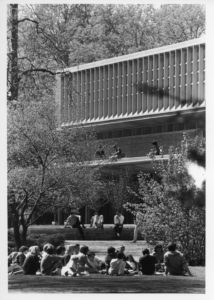
“My first and lasting memory of Washington U. was Freshman Camp, down in the Ozarks. [It was a] beautiful location, fun and so great to have faculty there to talk about their fields.
“And, if I get two memories, the other is connected to the opening of Olin Library. We students formed a line from Brookings to Olin and passed all the books along, transferring them from one building to the other. I suppose that, today, something like that might be done by drones :), but involving the students was much more fun and connected us to the new library just like that. The fact that it’s a beautiful building — and substituted, at least in part, for the student union we did not have and for which we were clamoring — also helped us accept the huge new building that covered so much of the grass we loved.”
— Marianne Heinicke Gupta, AB ’63
Meaningful off-campus experience:
“I sang in a ‘Greek’ choir (meaning sorority/fraternity). Before Christmas break (that’s what we called it back then), a dozen of us who had been rehearsing together walked to St. Mary’s Hospital and caroled in the halls, even going to sing to the newborns and their parents. It was an experience that took us off campus to do something meaningful in the St. Louis community, representing ourselves, our organizations and our university.”
— Cheryl Whatley, AB ’71, MA ’75
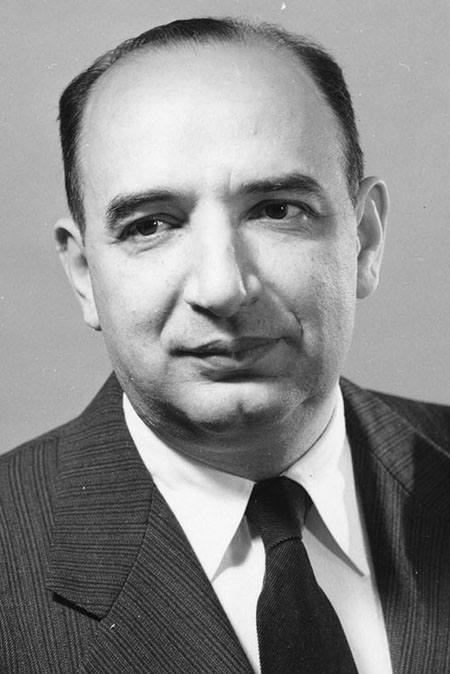
Physics of the environment:
“[I] had a physics teacher, Alexander Calandra, who designed a science class art students. This was the most amazing class … giving us a real understanding of the physics of the environment we would be working in and living in in our specialized fields. Calandra later designed some math [curriculum] for the St. Louis Public School District.”
— Donna Dean Felt, BFA ’54
Working at the university after graduation:
“I graduated in 1952 from the School of Business and then went directly to work for Washington University. I worked for the university for 38 years and retired in 1990.
“The ladies sitting in the WashU Quad (pictured below) were in the accounting office when I started. There was no IBM, no computers, just ladies using bookkeeping machines. I took a job as an accountant expecting to get a little experience and move on. I stayed 38 years.”
— Joe Evans, BSBA ’52
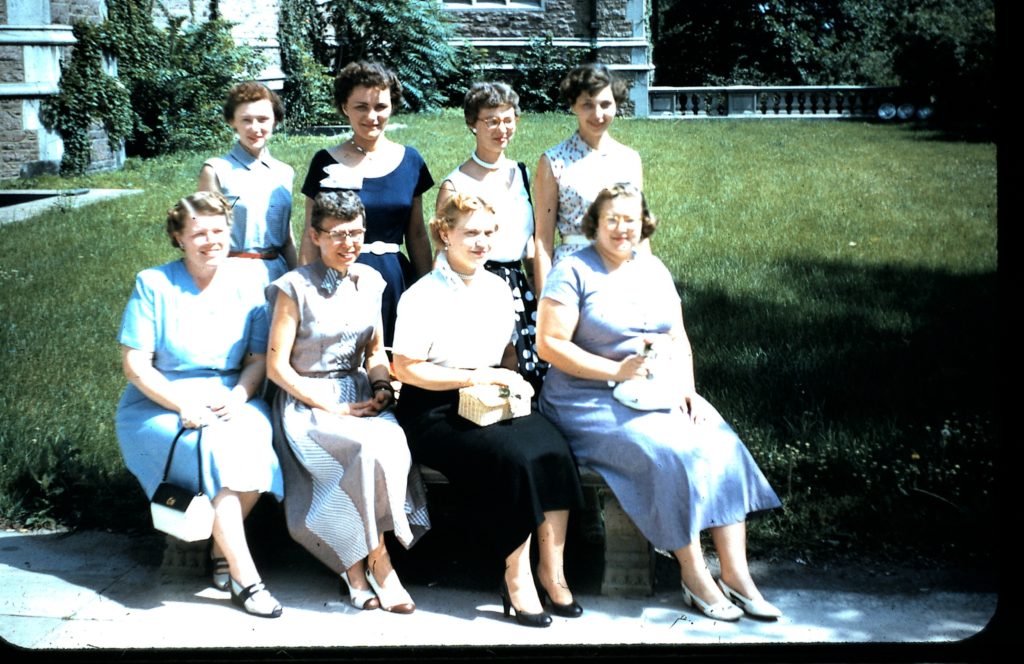
On distinguished faculty:
“My favorite memories of our Washington University are from our distinguished professors of anatomy and from our distinguished professors of pathology on which I base my knowledge of diagnostic medicine.”
— Col. Josh Grossman, MD ’65, FACP
On Chancellor Compton and Commencement:
“A vivid memory: marching in the 1947 Commencement headed by Chancellor Arthur H. Compton* in his full regalia.”
— Wallace G. Klein, AB ’47, MA ’48
*Arthur H. Compton served as chancellor of Washington University from 1945 to 1953. He won the Nobel Prize in Physics in 1927.
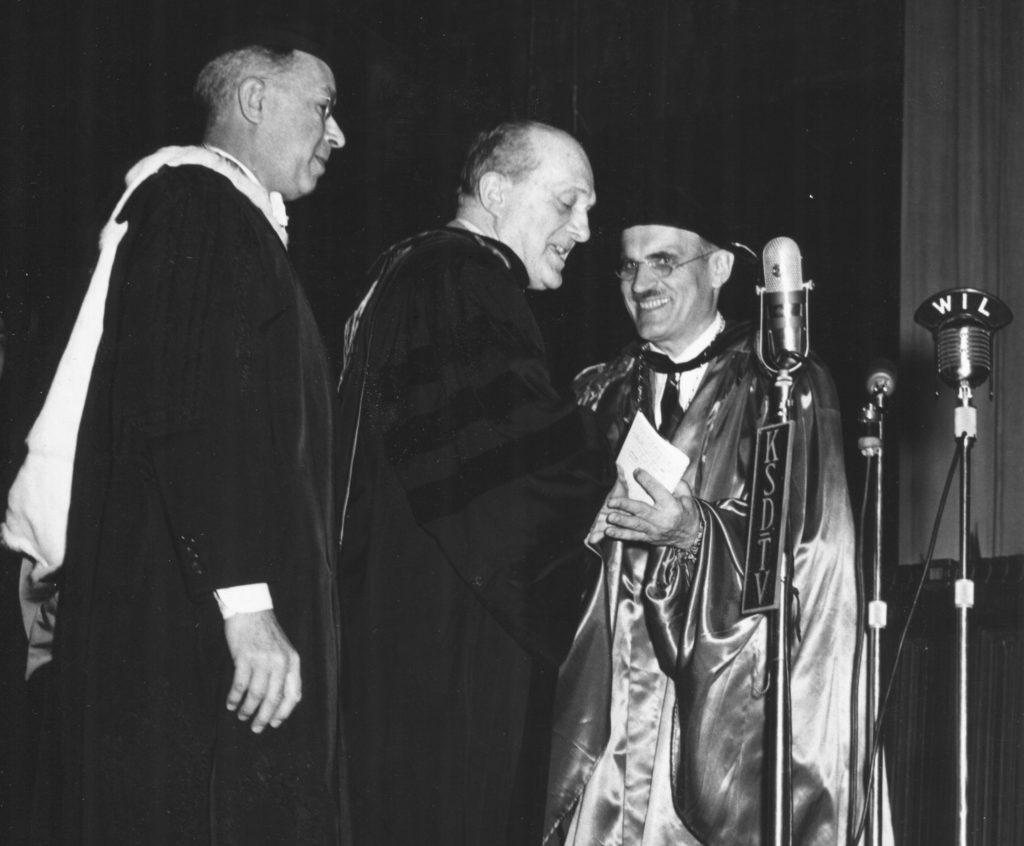
Howard Nemerov and nature:
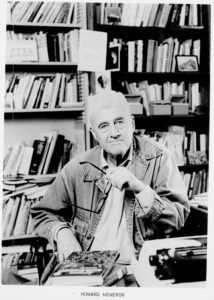
“On an impossibly beautiful Spring day circa 1975, Professor Nemerov* proposed to conduct our last class of the semester outdoors. On a day like that, it didn’t seem right to stay closed up in a classroom. The class agreed to move outside, and everyone filed out of Duncker Hall into the Quad, where we sat down on the grass, facing him. The pink Quad buildings framed a perfect blue sky full of birds, and every plant was flushing green. Professor Nemerov began to read and discuss English poetry in his unique and personal way, but it didn’t take long for him to notice that the students’ attentions were wandering; the magnificent weather was simply too distracting. Conceding the futility of his outdoor classroom, Nemerov interrupted his own lecture and remarked, ‘When Art and Nature compete, Nature always wins.’ He then excused the class.
“I still have all my notes from the course, but that comment has stuck with me without ever having written it down. On such a day, what was the point of studying the representation of nature in poetry? It took a poet to put it succinctly.”
— Robert G. Simon, AB ’76
*Howard Nemerov served on the university’s faculty from 1969 until his death in 1991. A former U.S. Poet Laureate and Pulitzer Prize-winner, he also was a novelist, essayist and critic.
